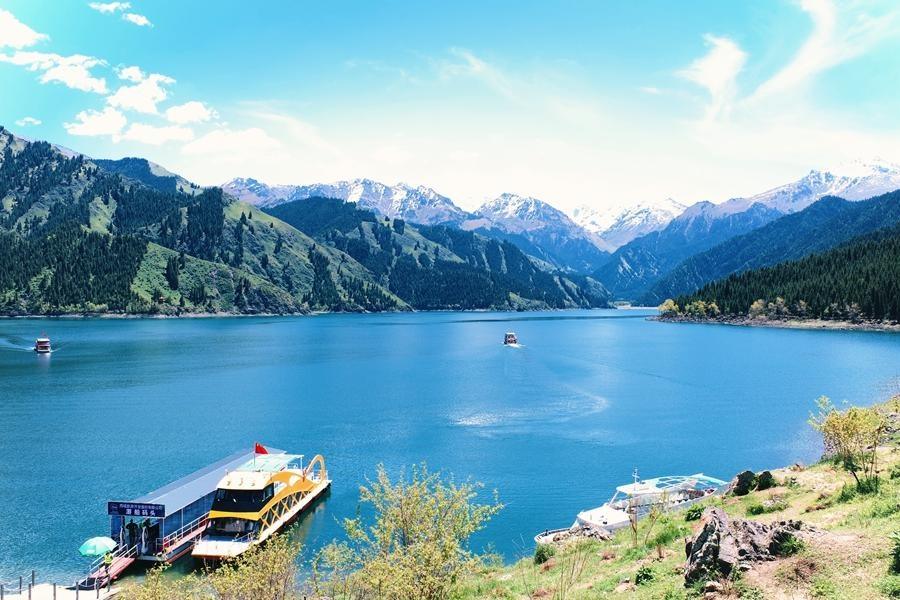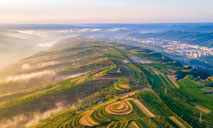Interview: I might cry tears of joy when Olympic flame is lit at opening ceremony, says JOC president Yamashita
TOKYO, July 13 (Xinhua) -- When the Olympic flame is finally lit at the opening ceremony of the Tokyo Games in just 10 days, Yasuhiro Yamashita, president of the Japan Olympic Committee (JOC), said that he might be crying tears of joy.
The Games have been postponed by one year due to the COVID-19 pandemic and will kick off on the night of July 23.
"When the sacred flame is lit, I will be as emotional as all the athletes," the Japanese judo legend said. "I might cry with joy."
In an interview with Xinhua at his office overlooking the Olympic Stadium, Yamashita admitted that pushing back the games by one year is a right and hard decision.
"We had no other choice," he said. "The pandemic is much worse than originally predicted. Every time we think that it's easing off, it turns serious again. And now we are entering a state of emergency for the fourth time. I think the most difficult thing is how to deal with the pandemic."
Yamashita, who was re-elected as JOC president last month, said that safety is still the priority of the Games.
"The COVID-19 situation has not changed for the better," he said. "This makes me worry all the time. Athletes from all over the world are coming to Japan. What I care about most is to ensure they have a good and safe environment."
He said that he never thought about canceling the Games even during the most difficult time.
"I had thought that we could hold the Games without spectators, but never thought about the cancellation. We will not only hold the Games in a safe and secure manner but also well contain the pandemic in Tokyo and other places of Japan so that the athletes can return home without being infected.
"By doing all these things, we can say that we have successfully held the Olympics. I hope that I can enjoy the successful moment at that time."
No athlete knows better than Yamashita about how precious it is to compete at the Olympics. After qualifying for the 1980 Moscow Olympics, the judo heavyweight couldn't compete because Japan had pulled out of the Games after the Soviet Union's 1979 invasion of Afghanistan. He had to wait for another four years to win his only Olympic gold medal at the 1984 Los Angeles Olympics.
"By postponing the Games, many athletes have missed the once-in-a-lifetime chance to compete at the Olympic Games. Even if you can compete in two or three Olympics, you usually have only one time to stay in peak shape during the Olympics."
He believed that with up to 80 percent of athletes fully vaccinated and details of countermeasures ready in the playbooks, there should be "no problem" to have a successful Games.
The JOC originally targeted 30 gold medals before the pandemic last year, but Yamashita admitted that that is no longer the goal.
However, he still thinks that Japanese athletes will enjoy some advantages in gymnastics, wrestling, swimming, baseball and two new events, skateboarding and karate.
"I hope that Japanese athletes will not feel pressured by the goals and just do their best and do their utmost," he added.
Like Kano Jigoro, the founder of judo, Yamashita has done a lot to promote cultural and sports exchange between Japan and China. He helped to establish two judo schools in Qingdao, Shandong Province, and Nanjing, Jiangsu Province.
"I think Mr. Kano would be very happy if he knew what I have done in China," he said. "Mr. Kano established a school in Tokyo that accepted thousands of Chinese students in early last century. He just wanted to do something for the Chinese students. I think that I have the same target as Mr. Kano."
When the Qingdao judo school was founded in 2008, some people in Japan doubted the necessity to do so, but Yamashita decided to move on with the project.
"China and Japan are neighbors with very long and deep ties in history," he said. "To maintain continued exchange among the people is beneficial to both sides. I am very confident and want to tell everybody.
"If Japan wants to be understood by China, it should try hard to understand China. I think that this is exactly the role that sports can play to promote the exchange between different countries."
Yamashita, who was a hot favorite to win the heavyweight gold medal at the 1980 Moscow Olympics, had to watch from the stands as a spectator, while top rivals vied for the gold. He believes that Japan will not boycott the Beijing Winter Olympic Games, which will take place six months after the closing of the Tokyo Games.
"We cannot deprive the athletes' chance of competing at the Olympics," he said. "I think Japan will not boycott. As far as I know, although there are government officials in some countries making some comments (about boycott), there has not been a single local Olympic committee that has agreed with such remarks."
He said that Japanese athletes will definitely compete and try to win in Beijing.
"Japanese athletes will not only compete, but also put up great performances. Our athletes are very strong in both summer and winter events. I attended the 2008 Beijing Olympic Games and look forward to visiting Beijing again next February. I think our athletes will achieve very good results in Beijing."
Photos
Related Stories
- Zambia upbeat on women's team's Olympic prospects
- Bilbao annoyed at exclusion from Spanish Olympic cycling team
- Worries rise as Tokyo 2020 sailing athletes in same hotel with local tourists
- China names women's football squad for Tokyo Olympics
- Kazakhstan's skiers attend training session for 2022 Beijing Winter Olympic Games
Copyright © 2021 People's Daily Online. All Rights Reserved.










